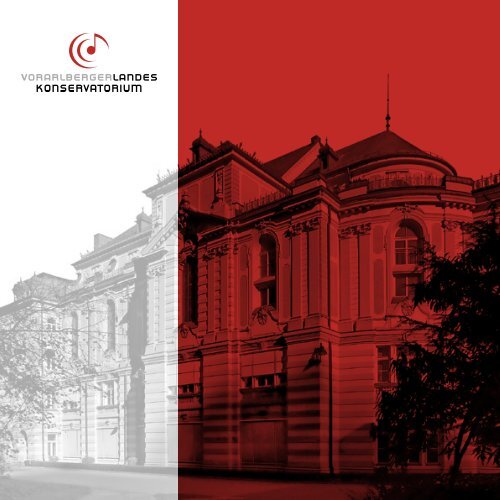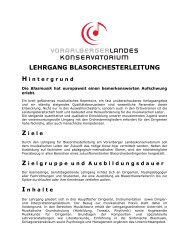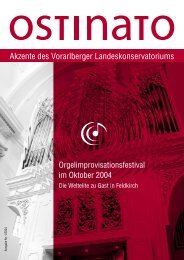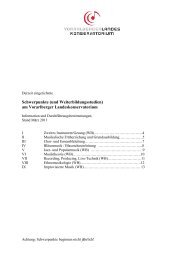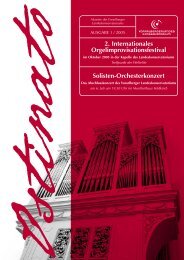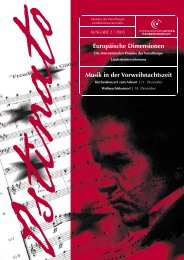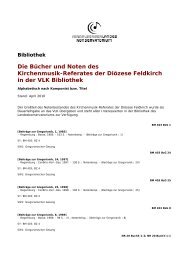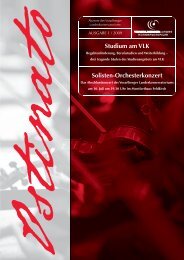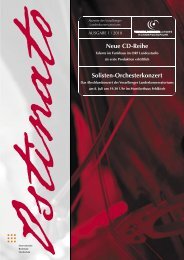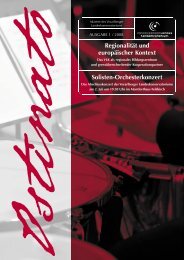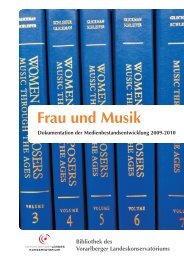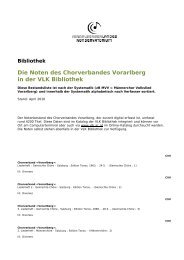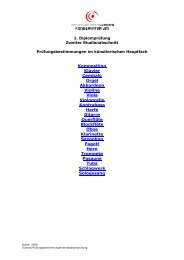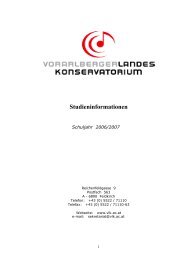Landeskonservatorium Vorarlberg
Landeskonservatorium Vorarlberg
Landeskonservatorium Vorarlberg
Create successful ePaper yourself
Turn your PDF publications into a flip-book with our unique Google optimized e-Paper software.
Ein Haus mit langer Tradition und neuen Impulsen.<br />
Das <strong>Vorarlberg</strong>er <strong>Landeskonservatorium</strong> in idealer<br />
geographischer Lage im Herzen Europas hat Zukunft.<br />
Vergangenheit wird reflektiert, Gegenwart erkannt<br />
und das Morgen gestaltet: International und interdisziplinär,<br />
mit höchstem Anspruch an die Qualität<br />
von Kunst und Lehre, Wissenschaft und Management.<br />
Das <strong>Vorarlberg</strong>er <strong>Landeskonservatorium</strong> – zentraler<br />
Kulturträger und Kompetenzzentrum mit internationaler<br />
Ausstrahlung.<br />
A house with long tradition and new impulses.<br />
The <strong>Vorarlberg</strong> State Conservatory with its ideal geographical location in the heart of Europe has<br />
a future. Because we reflect the past, recognise the present and shape tomorrow: international<br />
and interdisciplinary, with the highest demands of art and education, science and management.<br />
The <strong>Vorarlberg</strong> State Conservatory— central cultural institution and centre of excellence with<br />
international resonance.<br />
Una casa con larga tradicion y nuevos impulsos.<br />
El Conservatorio de <strong>Vorarlberg</strong> con su situación geográfica ideal en el corazón de Europa<br />
tiene futuro. Ya que refleja el pasado, reconoce el presente y modela el futuro: internacional<br />
e interdiciplinario, con altas aspiraciones de calidad artística, de enseñanza, de ciencia y<br />
administración. El Conservatorio del Estado de <strong>Vorarlberg</strong> es representante cultural, centro<br />
de competencia con resonancia internacional.
Die etwa 350 Studierenden aus<br />
18 Nationen am <strong>Vorarlberg</strong>er <strong>Landeskonservatorium</strong><br />
werden von 70<br />
international besetzten Dozenten aus<br />
13 verschiedenen Ländern in persönlicher<br />
Weise in einem Gebäudekomplex<br />
betreut, der über 12.000m² umfasst.<br />
Einzigartige, von Parkanlagen und Natur<br />
umgebene Architektur und Infrastruktur<br />
tragen zu erfüllendem Arbeiten und<br />
Studieren bei. Zur Verfügung stehen<br />
hochwertigste Instrumente in hervorragendem<br />
Zustand für alle Fachbereiche<br />
der Musik.<br />
Der Mensch macht die Musik.<br />
The individual sets the tone.<br />
El individuo hace la musica.<br />
Approximately 350 students of 18 nations<br />
enjoy the personal attention of 70 international<br />
instructors from 13 different<br />
countries in a building complex encompassing<br />
over 12.000 m 2 . Unique, surrounded<br />
by parks and nature, the campus and its<br />
infrastructure facilitate rewarding work<br />
and study. An array of high quality instruments<br />
in top condition is at the disposal of<br />
all departments.<br />
Alrededor de 350 estudiantes procedentes<br />
de 18 diferentes países son asesorados per-<br />
sonalmente por un cuerpo internacional<br />
de 70 docentes procedentes de 13 naciones<br />
diferentes en un complejo de instalaciones<br />
que abarca mas de 12.000 m 2 .<br />
Su arquitectura rodeada de zonas verdes y<br />
con estacionamiento al alcance hacen posibles<br />
condiciones optimas para el trabajo<br />
y el estudio.<br />
El Conservatorio cuenta tambien con valiosos<br />
instrumentos en exelentes condiciones<br />
para todos los sectores de la música.
Unsere DozentInnen sind international, ihre Berufung ist<br />
die Kunst. Die Vermittlung von Können, von Wissen und<br />
Leidenschaft, Enthusiasmus, Tiefe und Weite. Unabhängig<br />
davon, ob das Studienziel ein künstlerisches oder ein<br />
pädagogisches ist.<br />
Die universitäre Ausrichtung.<br />
Die Grundlage für den Studienbetrieb am <strong>Vorarlberg</strong>er<br />
<strong>Landeskonservatorium</strong> sind die europäischen Bildungsstandards,<br />
ab dem Studienjahr 2005/06 wird in Kooperation<br />
mit der Musikuniversität Mozarteum Salzburg der akademische<br />
Studienabschluss Bachelor eingeführt.<br />
Die Ausbildungsmöglichkeiten im Einzelnen:<br />
• Studium der Instrumental- und Gesangspädagogik in<br />
Zusammenarbeit mit der Musikuniversität »Mozarteum«<br />
Salzburg<br />
• Diplom-Konzertfach in allen Orchesterinstrumenten,<br />
Klavier, Orgel und Gesang<br />
• Vorbereitungsstudiengänge in allen Orchesterinstrumenten,<br />
Klavier, Orgel und Gesang<br />
• Lehrgang Chorleitung<br />
• Lehrgang Blasorchesterleitung<br />
• Lehrgang Katholische Kirchenmusik C<br />
• Fort- und Weiterbildung für MusikschullehrerInnen,<br />
Instrumental- und GesangspädagogInnen<br />
• Ausbildungsschwerpunkte für »Neue Musik« sowie<br />
»Musik und Medizin«<br />
• Interdisziplinäre Vernetzungen mit dem »Theater am Sau-<br />
markt«, dem »Tanzherbst«, dem »Feldkirch Festival« etc.<br />
• Jährliche Meisterkurse mit international renommierten<br />
KünstlerInnen<br />
Kompetenz und<br />
Internationalität.<br />
Expertise and internationality.<br />
Competencia e internacionalidad.<br />
Our faculty is international, its vocation is artistry. The communication<br />
of skill, knowledge and passion, enthusiasm, breadth<br />
and depth. Irrespective of whether the goal of study is performance<br />
or pedagogy.<br />
University oriented.<br />
European educational standards form the basis of the scholastic<br />
enterprise at the Conservatory. As of the school year<br />
2005/06, it will introduce a Bachelor Degree in cooperation<br />
with the Music University Mozarteum Salzburg.<br />
The available courses of study in detail:<br />
• Bachelor of Music Education (vocal or instrumental) in collaboration<br />
with the Music University Mozarteum in Salzburg<br />
• Performance Diploma — orchestra instruments, piano,<br />
organ, accordion and voice<br />
• Preparatory studies — orchestra instruments, piano, organ,<br />
accordion and voice<br />
• Seminar in choral conducting<br />
• Seminar in conducting of wind ensembles<br />
• Seminar in Catholic Church music “C”<br />
• Continuing education for music school teachers, instrumen-<br />
tal and vocal teachers<br />
• Instructional topics for “New Music” and “Music and<br />
Medicine”<br />
• Interdisciplinary integration with the “Theater am<br />
Saumarkt”, “Tanzherbst“”, “Feldkirch Festival”, etc.<br />
• Yearly master classes with internationally renowned artists<br />
El cuerpo de docentes es internacional, su vocación: la cultura<br />
e impartir su capacidad, conocimientos y pasión, entusiasmo,<br />
profundidad y amplitud, independientemente de cual sea la<br />
meta del estudiante: artística o pedagógica.<br />
Orientación universitaria.<br />
Los programas de estudios estan basados en los niveles vigentes<br />
europeos. A partir del año escolar 2005/06 sera posible<br />
adquirir el titulo académico de «Bachelor» (Licenciatura) en<br />
cooperación con la Universidad de Musica «Mozarteum» de<br />
Salzburgo.<br />
Las carreras específicas:<br />
• Carreras de pedagogia instrumental y vocal en coordinación<br />
con la Universidad de Musica «Mozarteum» de Salzburgo<br />
• Diploma de concertismo para todos los instrumentos orquestales<br />
asi como para piano, organo y canto<br />
• Estudios preparatorios para todos los intrumentos orquestrales,<br />
asi como para piano, organo y canto<br />
• Cursos de dirección coral<br />
• Cursos de dirección de orquestas de alientos<br />
• Cursos de musica sacra católica<br />
• Cursos de perfeccionamiento para maestros de música, pedaggos<br />
instrumentalistas y vocales<br />
• Intrucción especializada en música contemporánea asi como<br />
medicina y música<br />
• Red de interacción con el teatro «Saumarkt» en Feldkirch,<br />
«Otoño de Danza», «Festival de Feldkirch», etc.<br />
• Cursos anuales de perfeccionamiento con maestros de<br />
renombre internacional
Ein einzigartiges Ambiente.<br />
Unique ambience.<br />
Un ambiente único y singular.<br />
Eine Umgebung, die einlädt zur schöpferischen Wechselwirkung zwischen<br />
jungen Menschen und alten Mauern, klassizistischer Architektur und modernem<br />
Leben. Es gibt nicht viele Institute, die ihren Dozenten, Studenten,<br />
Künstlern, Veranstaltern und Publikum diese anregende Umgebung bieten<br />
können.<br />
Surroundings that invite creative interplay<br />
between young people and old walls, between<br />
classic architecture and modern life,<br />
between nature and culture. Few institutions<br />
can offer its professors and students<br />
— as well as promoters, performers<br />
and audiences — such an inspiring setting.<br />
El Conservatorio de <strong>Vorarlberg</strong> se encuentra<br />
enclavado en un ambiente que invita<br />
al intercambio creador: entre la gente<br />
joven y sus muros antiguos, su arquitectura<br />
clásica y la vida moderna. Hay pocos<br />
institutos que puedan ofrecer a sus docentes,<br />
estudiantes, artistas, organizadores y<br />
al público este ambiente tan estimulante.
Stilvolle Räume für Ihre Veranstaltung.<br />
Das Konservatorium ist offen. Für Kunst<br />
und Kultur, für private, gewerbliche und<br />
institutionelle Veranstalter. Ob im Festsaal<br />
mit seinen 450 Sitzplätzen, Kleiner<br />
Konzertsaal, Kapelle mit 500 Sitzplätzen<br />
oder Pförtnerhaus – der Ton macht die<br />
Musik und das Ambiente die Veranstaltung.<br />
Geschichte auf neuestem Stand.<br />
Sowohl was die technische Infrastruktur<br />
als auch den Support und Service des<br />
Hauses angeht, finden Veranstalter wie<br />
Besucher modernste Einrichtungen.<br />
Stylish settings for your event.<br />
The Conservatory is open. For art and<br />
culture, for private, business and institutional<br />
hosts. Whether in the Festival Hall<br />
with its 450 seats, the Minor Hall, the<br />
Chapel with 500 seats or the Gatehouse<br />
— the tone makes the music and the ambience<br />
the event.<br />
Tradition up to date.<br />
Hosts and visitors will find the most modern<br />
facilities regarding technical infrastructure<br />
as well as support and service.<br />
Exclusivas salas de eventos.<br />
El Conservatorio de <strong>Vorarlberg</strong> está abierto<br />
al público: para arte y cultura, para<br />
organizaciones privadas, institucionales,<br />
e industriales. Ya sea la «Festsaal» con cupo<br />
para 450 personas, la «Sala pequeña», la<br />
capilla con cupo para 500 personas o la<br />
«Pfoertnerhaus» – el tono hace la musica,<br />
y el ambiente la presentación.<br />
Instalaciones historicas al tanto de la<br />
época actual.<br />
Tanto la infraestructura técnica como el<br />
cunjunto de servicios del Conservatorio<br />
ofrecen las posibilidades mas modernas.
Die wissenschaftliche Musikbibliothek mit ihren über 30.000<br />
Medien dient neben der Unterstützung von Lehre und Studium<br />
am <strong>Vorarlberg</strong>er <strong>Landeskonservatorium</strong> zugleich der regionalen,<br />
nationalen und internationalen Literatur- und Informationsvermittlung.<br />
Seit der Neueröffnung 2000 steht nun auch der<br />
Öffentlichkeit ein moderner Dienstleister im musikwissenschaftlichen<br />
und musikpädagogischen Bereich zur Verfügung.<br />
Der Musik verpflichtet. Und ihrer Verfügbarkeit.<br />
Dedicated to music. And to its availability.<br />
Nuestro deber es la música y su adquisición.<br />
The academic music library with over 30,000 items, besides serving<br />
the needs of the conservatory, also helps the regional, national and<br />
international dissemination of information and literature. Since its<br />
reopening in 2000, this service oriented library specialising in musicology<br />
and music education is available to the public.<br />
Cuenta con una biblioteca de musicología con mas de 30.000<br />
medios que proporciona información y apoyo para el aprendizaje<br />
y estudio tanto a nivel regional, nacional e internacional.<br />
Desde su reapertura en el año 2000 esta a la disposición del<br />
público un area especializada en musicología y pedagogía.
Büro für Internationale<br />
Beziehungen<br />
Office . for International Relations.<br />
Oficina de relaciones internacionales.<br />
Das Büro für Internationale<br />
Beziehungen pflegt die Kooperationen<br />
mit ausländischen<br />
Universitäten, Musikhochschulen,<br />
Konservatorien<br />
und anderen Institutionen<br />
und ist Ansprechpartner für<br />
alle Fragen der Studierenden-<br />
und Lehrendenmobilität.<br />
Der Aufgabenbereich erstreckt<br />
sich zudem auf<br />
• Beratung und Betreuung<br />
ausländischer StudienbewerberInnen<br />
und Studierender<br />
• Vermittlung von grundlegenden<br />
Informationen zu Studienmöglichkeiten,Zulassungsvoraussetzungen,<br />
Studieninhalten und -anforderungen<br />
• Informationen zum Auslandsstudium<br />
• Koordination und Betreuung<br />
internationaler Projekte<br />
The Office for International<br />
Relations promotes the cooperation<br />
with foreign universities,<br />
music academies and conservatories<br />
as well as with other<br />
institutions, and is the advisor<br />
for all questions concerning<br />
student and teacher mobility.<br />
The scope of service includes:<br />
• Counselling and guidance for<br />
foreign applicants and students<br />
• Communication of basic infor<br />
mation concerning study opportunities,<br />
admissions, curriclum<br />
and requirements<br />
• Information about foreign<br />
studies<br />
• Coordination and supervision<br />
of international projects<br />
La oficina de relaciones internacionales<br />
se encarga de cooperar<br />
con Universidades, Escuelas<br />
Superiores de Música, Conservatorios<br />
y otras instituciones y<br />
funge como intermediario en<br />
cuestiones de mobilidad para<br />
estudiantes y profesores. Sus<br />
funciones son:<br />
• Consultación, asesoramiento<br />
y orientación para estudiantes<br />
y aspirantes extranjeros<br />
• Información acerca de las<br />
posibilidades de estudio, requisitos<br />
de admisión y contenido<br />
de estudios<br />
• Información acerca de estudios<br />
en el extranjero<br />
• Coordinación y atención a<br />
proyectos internacionales<br />
Kontakt /Contact /Contacto<br />
Herr Jörg-Maria Ortwein<br />
<strong>Vorarlberg</strong>er <strong>Landeskonservatorium</strong> GmbH<br />
Reichenfeldgasse 9<br />
A - 6800 Feldkirch<br />
Tel. +43 (0) 699 / 128 724 63<br />
joerg.maria.ortwein@vlk.ac.at
<strong>Vorarlberg</strong>er <strong>Landeskonservatorium</strong> GmbH Reichenfeldgasse 9 A - 6800 Feldkirch<br />
Tel. +43 (0) 55 22 / 711 10 - 0 Fax +43 (0) 55 22 / 711 10 - 63 sekretariat@vlk.ac.at www.vlk.ac.at
<strong>Vorarlberg</strong>er <strong>Landeskonservatorium</strong> GmbH – International Office – www.vlk.ac.at<br />
1
ECTS Information Package<br />
Study Guide for International Students<br />
Studying and Living in Feldkirch & <strong>Vorarlberg</strong><br />
Sharing borders with Germany, Switzerland and Liechtenstein, <strong>Vorarlberg</strong> is Austria’s westernmost<br />
state and is part of one of the strongest economic regions in the European Union.<br />
Although <strong>Vorarlberg</strong> is a small state with a population of 350,000, it boasts a surprising number of<br />
mainstream and alternative cultural institutions and events that cater to every taste. Detailed listings<br />
of events can be found in the cultural magazine Kultur and the daily newspaper <strong>Vorarlberg</strong>er<br />
Nachrichten.<br />
In addition to art and culture, <strong>Vorarlberg</strong> – with its mountains, lakes and fine recreational facilities –<br />
also provides excellent conditions for lots of different types of sports, such as skiing, snowboarding,<br />
swimming, surfing, golf, tennis, climbing, mountain biking and canyoning, etc.<br />
Feldkirch is a fascinating and beautiful medieval centre. Welcome to the best preserved medieval<br />
township in <strong>Vorarlberg</strong> which shows the unique transitions between the past centuries. Stone<br />
witnesses from a long ago era tell us the story of the westernmost city in Austria the story of<br />
medieval times. Stroll through the centuries and underneath the arcades of the medieval centre<br />
Feldkirch.<br />
The <strong>Vorarlberg</strong>er <strong>Landeskonservatorium</strong>, the original seat of the Jesuit school „Stella Matutina“,<br />
was built in 1900/1901 by the Jesuit Order who had already come to Feldkirch in 1649. In 1938 the<br />
Nazi regime closed down the Stella Matutina and used the building as a German Reich financial<br />
school. Later on it was used as a military hospital. The grammar school Stella Matutina existed from<br />
<strong>Vorarlberg</strong>er <strong>Landeskonservatorium</strong> GmbH – International Office – www.vlk.ac.at<br />
2
ist reopening in 1946 until 1979. Ever since, the building has been known as the <strong>Vorarlberg</strong>er<br />
<strong>Landeskonservatorium</strong> and is open to some 400 students studying music.<br />
The capital of <strong>Vorarlberg</strong>, Bregenz, on the eastside of the Lake of Constance, possesses a unique<br />
medieval town center above the busy streets of modern Bregenz, as well as the largest openair<br />
stage on the lake with a charming promenade. Worth seeing: Pfänder cable car, Alpine game park<br />
Pfänder and eagle show, Festival house, “Kunsthaus” Art gallery. World famous cities and cultural<br />
centres are also within easy reach of <strong>Vorarlberg</strong>: For example, Zurich (125 km), Innsbruck (155<br />
km), Munich (220 km) or Milan (260 km).<br />
FullTime Degrees<br />
Bachelor of Arts: Instrumental and Voice Pedagogy<br />
As of 2005, the <strong>Vorarlberg</strong>er <strong>Landeskonservatorium</strong> offer a Bachelor of Arts in Music Education<br />
(vocal or instrumental) in collaboration with the Music University Mozarteum in Salzburg. This<br />
undergraduate study provides a wellrounded artistic, pedagogic and scientific education in keeping<br />
with international standards of quality. This study furthers the acquisition and refinement of<br />
abilities, knowledge and experience, at the same time encourages critical observation, evaluation<br />
and documentation. The breadth of the training guarantees versatility for future professional<br />
practice, whether in music education, cultural management or media, freelancing, etc. The<br />
foundation for lifelong learning is firmly established. The Bachelors Degree is recognised<br />
worldwide and enables continuation of studies for a master degree at any university or college. It<br />
also facilitates application for work in other European countries; cumbersome recognition<br />
procedures are a thing of the past!<br />
The course of study in IGP normally takes four years. As part of the study, one must choose a minor<br />
an instrument or special area of study. Except for minors in contemporary music and composition<br />
techniques, an audition is required. The following minors are available: second instrument (voice),<br />
preschool music education, choral or ensemble conducting, pop and jazz music, contemporary<br />
<strong>Vorarlberg</strong>er <strong>Landeskonservatorium</strong> GmbH – International Office – www.vlk.ac.at<br />
3
music and composition techniques.<br />
At present, following majors can be chosen:<br />
piano, organ, harpsichord, accordeon, violin, viola, violoncello, contrabass, harp, guitar, flute,<br />
recorder, oboe, clarinet, bassoon, saxophon, horn, trumpet, trombone, tuba, percussion and voice.<br />
Fulltime Degree „Künstlerisches Diplomstudium“ (A2, A3)<br />
The curriculum of this performance diploma is designed to develop mature professional skills on<br />
one's chosen instrument as well as familiarity in music theory. The course is divided into two stages<br />
of eight and four semesters, with a continuation exam in the middle. One may begin studying with<br />
15 years of age; conclusion of studies takes place with the nationally recognised performance exam.<br />
Performance majors are presently offered in:<br />
piano, organ, harpsichord, accordeon, violin, viola, violoncello, contrabass, harp, guitar, flute,<br />
recorder, oboe, clarinet, bassoon, saxophon, horn, trumpet, trombone, tuba, percussion, voice and<br />
composition.<br />
The ECTS System<br />
ECTS, the "European Credit Transfer System," was developed by the Commission of the European<br />
Union in order to provide common procedures to guarantee academic recognition of studies abroad.<br />
It provides a way of measuring and comparing learning achievements and transferring them from<br />
one institution to another.<br />
ECTS is based on the principle of mutual trust and confidence between the participating<br />
institutions. The few rules of ECTS, concerning information on courses available, agreement<br />
between the home and host institutions, and the use of credit points to indicate student workload,<br />
<strong>Vorarlberg</strong>er <strong>Landeskonservatorium</strong> GmbH – International Office – www.vlk.ac.at<br />
4
are set out to reinforce this mutual trust and confidence.<br />
<strong>Vorarlberg</strong>er <strong>Landeskonservatorium</strong> the Institution<br />
Name and Address<br />
<strong>Vorarlberg</strong>er <strong>Landeskonservatorium</strong> GmbH<br />
Reichenfeldgasse 9<br />
6800 Feldkirch<br />
Austria<br />
Phone: +43.5522.71110.0<br />
Fax: +43.5522.71110.63<br />
sekretariat@vlk.ac.at<br />
Internet: www.vlk.ac.at<br />
General Practical Information<br />
Planning your stay and host country formalities<br />
You are advised to inform yourself about Austria and its people before leaving as well as to<br />
consider what you have to bring and what you can expect upon your arrival. Good sources for this<br />
kind of information are local students, different travel guides as well as the Internet.<br />
Visa and Conditions of Residence<br />
EU Residents:<br />
Citizens of EU member states need a valid travel document (passport) for their entry and residence<br />
in Austria. They are also required to have adequate funds and health insurance (E 111 or E 128<br />
<strong>Vorarlberg</strong>er <strong>Landeskonservatorium</strong> GmbH – International Office – www.vlk.ac.at<br />
5
form or ecard) for the duration of their stay.<br />
NonEU Residents:<br />
Citizens of other countries need to contact the nearest Austrian embassy or consulate in their<br />
country of origin to determine visa and residency permit requirements for their individual case. This<br />
should be done well in advance of the planned date of entry into Austria as processing time can take<br />
up to two to three months and needs to be done outside of Austria.<br />
Important<br />
Upon arrival in Austria, all students are obliged to register with the police (Meldeamt) within the<br />
first three days of arrival. The International Office at the <strong>Vorarlberg</strong>er <strong>Landeskonservatorium</strong> will<br />
help students to fill out and submit this registration form during the first day of the orientation.<br />
More information on http://www.oead.ac.at/_english/austria/index.html<br />
How to apply<br />
Application and Admission Procedures for Exchange Students (Guest Students)<br />
Students who wish to study as exchange students at <strong>Vorarlberg</strong>er <strong>Landeskonservatorium</strong> within the<br />
framework of an exchange program are requested to contact first the international office at their<br />
home university to make sure that they will be nominated by their home institution.<br />
If there is no bilateral agreement between your home university and the <strong>Vorarlberg</strong>er<br />
<strong>Landeskonservatorium</strong> please check if your home university will accept your planned semester<br />
abroad.<br />
After getting permission from your home institution please submit your application electronically<br />
(email) as well as on paper. The completed application has to been sent by mail to the following<br />
address:<br />
<strong>Vorarlberg</strong>er <strong>Landeskonservatorium</strong> GmbH – International Office – www.vlk.ac.at<br />
6
<strong>Vorarlberg</strong>er <strong>Landeskonservatorium</strong> GmbH<br />
International Office<br />
Reichenfeldgasse 9<br />
A6800 Feldkirch<br />
Austria<br />
Email: joerg.maria.ortwein@vlk.ac.at<br />
Immediately after receiving your application we will send you more detailed information<br />
concerning your exchange semester.<br />
The Diploma Supplement<br />
The Diploma Supplement (DS) is a document attached to a higher education diploma aiming at<br />
improving international ‘transparency’ and at facilitating the academic and professional recognition<br />
of qualifications (diplomas, degrees, certificates etc.). It is designed to provide a description of the<br />
nature, level, context, content and status of the studies that were pursued and successfully<br />
completed by the individual named on the original qualification to which this supplement is<br />
appended. It should be free from any valuejudgements, equivalence statements or suggestions<br />
about recognition. It is a flexible nonprescriptive tool which is designed to save time, money and<br />
workload. It is capable of adaptation to local needs.<br />
The DS is produced by national institutions according to a template that has been developed by a<br />
Joint European Commission Council of Europe UNESCO working party that tested and refined<br />
it.<br />
The DS is composed of eight sections (information identifying the holder of the qualification,<br />
information identifying the qualification, information on the level of the qualification, information<br />
on the contents and results gained, information on the function of the qualification, additional<br />
<strong>Vorarlberg</strong>er <strong>Landeskonservatorium</strong> GmbH – International Office – www.vlk.ac.at<br />
7
information, certification of the Supplement, information on the national higher education system).<br />
Information in all eight sections should be provided. Where information is not provided, an<br />
explanation should give the reason why. Institutions have to apply to the DS the same<br />
authentication procedures as for the diploma itself.<br />
Benefits of the Diploma Supplement for Students:<br />
• A diploma that is more readable and easily comparable abroad.<br />
• A precise description of their academic curriculum and on the competencies acquired during<br />
the study period.<br />
• Objectivity and a fair judgement of their achievements and competencies<br />
• An easier access to opportunities of work or further studies abroad<br />
• It fosters their employability (employers are more and more interested by the student profile<br />
that is provided for in the DS).<br />
Benefits of the Diploma Supplement for Institutions of Higher Education:<br />
• It facilitates academic and professional recognition, thus increasing the transparency of<br />
qualifications.<br />
• It protects national/institutional autonomy while offering a common frame, which is<br />
accepted all over Europe.<br />
• It promotes informed judgements about qualifications that can be understood in another<br />
educational context.<br />
• It raises the visibility of the institution abroad.<br />
• It promotes the employability of their graduates at national and international level.<br />
• It helps saving time since it provides the answers to a lot of recurrent questions put to<br />
administrative services in institutions about the content and portability of diplomas.<br />
Academic calendar<br />
<strong>Vorarlberg</strong>er <strong>Landeskonservatorium</strong> GmbH – International Office – www.vlk.ac.at<br />
8
Course I: 1 st of october until 31 th of january<br />
Course II: 3 rd of march until 10 th of july<br />
General Practical Information<br />
Checklist to Plan Your Stay<br />
• Apply for or renew your passport. Make photocopies of it and leave one to someone reliable<br />
in your home country and take one with you in case the original gets lost or stolen.<br />
• Get medical checkups. Make appointments for complete medical, dental and eye<br />
examinations. Tell your doctors that you will be out of the country for an extended period of<br />
time and need to stock up on medical prescriptions for that time. Be sure to stock up on<br />
contact lenses or at least bring the prescriptions with you.<br />
• Apply for international driving license. If you plan to drive here, you will need an<br />
international driving license, which is also valid in Austria. Ask your country’s embassy for<br />
more information.<br />
• Inform magazines, catalogues and other parties sending you post of your change of address.<br />
If you don’t know your address in Austria yet, at least change your address to that of a<br />
trusted family member or friend in the meantime.<br />
• Almost all the accommodation possibilities have beddings (blankets and pillows), but<br />
sometimes own bed linen is needed. Note that the blankets and pillows may be of different<br />
sizes than the ones in your home county. The size of a blanket in Austria is normally 140 x<br />
200 cm and of a pillow 70 x 90 cm. Your are advised to bring your own towels if not stated<br />
otherwise.<br />
• Bring along all important documents and items you will need for your studies (e.g. 2<br />
passportphotos, dictionaries), health care (E111 or E128 form, or the ecard, or private<br />
health care insurance papers) and traveling (e.g. passport, tickets and traveling insurance<br />
papers).<br />
• You should make sure that you have enough cash or traveler’s checks for your arrival, as it<br />
<strong>Vorarlberg</strong>er <strong>Landeskonservatorium</strong> GmbH – International Office – www.vlk.ac.at<br />
9
might take some time before you will have a chance to take out money with your credit /<br />
cash card or to open an account in the local bank and receive money transactions from your<br />
home country.<br />
• Often students bring photos of their family or special things with them, which make the<br />
beginning in an new environment easier and helps to overcome possible feelings of being<br />
homesick.<br />
• You might want to bring some of the familiar food items (candies, diet foods, special spices,<br />
convenience food, etc.) until you get used to the Austrian labeling. Even though most likely<br />
it won’t take you a long time to find either the same products with different labels or similar<br />
products.<br />
• If you bring electronic advices from your home country, make sure you purchase adapter<br />
plugs, converters and transformers (e.g. from 110 to 220 volts) which match the Austrian<br />
standard two round prongs and the electricity of 220 volts.<br />
Travel Information<br />
The nearest airports are Altenrhein (CH) 40 km, Friedrichshafen (D) 45 km, Zurich Kloten (CH)<br />
145 km, Innsbruck (A) 160 km and Munich (D) 215 km. It is also possible to fly via Vienna (A).<br />
From there a train can be taken to Feldkirch either via Bregenz or Innsbruck, with a journey of<br />
approximately 2,5 (Zurich), 4,5 (Munich), and 8 hours (Vienna). The main train station in Feldkirch<br />
is “Feldkirch Hauptbahnhof.”<br />
For train connections to/from/in Austria, see the following links:<br />
Austrian Railway (link)<br />
German Railway (link)<br />
Swiss Railway (link)<br />
Taxis are available in front of the train station. Alternatively is it possible to use yellow busses<br />
<strong>Vorarlberg</strong>er <strong>Landeskonservatorium</strong> GmbH – International Office – www.vlk.ac.at<br />
10
(Regional busses). The journey from the train station to the Landesgericht/<strong>Vorarlberg</strong>er<br />
<strong>Landeskonservatorium</strong> takes approximately ten minutes and a single ticket cost about EURO 1,20.<br />
As a rule, students are met individually upon arrival in Feldkirch by a representative of the<br />
International Office and taken to their place of residence. It is therefore important that the<br />
International Office is informed of exact times of arrival. Students should plan to arrive between the<br />
office hours from 09:00 a.m. and 05:00 p.m.<br />
Cost of Living<br />
The cost of living in the western part of Austria is quite high. While expenses may vary, it is<br />
advisable to budget EURO 630 to EURO 730 for a month for accommodation and living.<br />
Costs (per month) for: (EURO)<br />
Rent 250 to 300<br />
Utilities 70<br />
Food 250 to 300<br />
Study Materials 25<br />
Copying Expenses 20<br />
Cost of Restaurant Meal with Drink 5 to 10<br />
Accommodation<br />
Lehrhotel Rätia<br />
Schillerstraße 8 a<br />
A6700 Bludenz<br />
Österreich <strong>Vorarlberg</strong><br />
Tel.: +43(0)5552/65811<br />
<strong>Vorarlberg</strong>er <strong>Landeskonservatorium</strong> GmbH – International Office – www.vlk.ac.at<br />
11
Fax.: +43(0)5552/6581132<br />
info@tourismusschulenbludenz.at<br />
Studentenheim der Schulbrüder<br />
Carinagasse 11<br />
A6800 Feldkirch<br />
Tel. +43.5522.3430<br />
Institut St. Josef<br />
Ardetzenbergerstrasse 31<br />
A6800 Feldkirch<br />
Tel. +43.5522.72471<br />
For actual informations contact judith.altrichter@vlk.ac.at<br />
Health and Insurance<br />
Health Care<br />
EU citizens should bring along the insurance form E111 or E128 or ecard, which covers health<br />
insurance in Austria. However, all students should contact their healthcare provider and determine<br />
what they need for fullinsurance coverage in Austria. Students who are privately insured should<br />
note that payment for doctors/hospital service will have to be made upfront before they are<br />
reimbursed by their insurance company. The International Office will help in finding doctors who<br />
can speak English.<br />
Students with special needs<br />
All <strong>Vorarlberg</strong>er <strong>Landeskonservatorium</strong> buildings/premises are completely wheelchair accessible.<br />
If you have any special wishes, you should contact the International Office of the <strong>Vorarlberg</strong>er<br />
<strong>Vorarlberg</strong>er <strong>Landeskonservatorium</strong> GmbH – International Office – www.vlk.ac.at<br />
12
<strong>Landeskonservatorium</strong> directly and describe what kind of assistance or treatment you need. We will<br />
help you on an individual basis.<br />
Insurance<br />
Students are advised to obtain household insurance and insurance against loss and damage to<br />
personal property. Note that the <strong>Vorarlberg</strong>er <strong>Landeskonservatorium</strong> is not liable for loss or damage<br />
to personal property or injuries to persons on its premises.<br />
Study Facilities<br />
Library<br />
The <strong>Vorarlberg</strong>er <strong>Landeskonservatorium</strong> Library is located in the 2 nd floor of the conservatory. It is<br />
an openstacks library with reading places, computer research stations, multimedia workstations,<br />
photocopying machine and hifistations. The library is free of charge for all students including<br />
exchange students as well as for staff. It is open to all, including the general public.You will receive<br />
more detailed information regarding the library services during the orientation program.<br />
Semester Opening Times:<br />
Mon 01:00 p.m. – 05:00 p.m.<br />
Tue 11:00 a.m. – 07:00 p.m.<br />
Wed, Thu 11:00 a.m. – 05:00 p.m.<br />
Other Practical Information<br />
Currency<br />
When arriving in Feldkirch it is useful to have some EURO available. Most stores accept common<br />
<strong>Vorarlberg</strong>er <strong>Landeskonservatorium</strong> GmbH – International Office – www.vlk.ac.at<br />
13
credit cards like VISA, MASTERCARD, and DINERS CLUB. Also, cashcards/ATM cards (EC<br />
Karten/BankomatKarten) are commonly used in shops. Cashcards/ATM cards can be ordered<br />
when opening a local bank account. All ATM machines can be accessed with a European ATM<br />
card and a foreign credit card with a pin number. Please note that it is not possible to get cash<br />
advances with credit cards at the bank counter.<br />
Banks and Public Offices<br />
Banks in Austria are normally open Mon – Fri from 08:00 a.m. to 12:00 p.m. and from 02:00 p.m.<br />
to 03:30 p.m., with some banks offering extended service hours on certain days. We normally<br />
advice exchange students to open a local bank account in order to be able to pay their monthly rent<br />
and bills easily and to make possible money transactions from the home country easier.<br />
Public offices are generally open from Monday until Friday between 08:00 a.m. and 12:00 p.m. and<br />
between 02:00 p.m. and 3:30 p.m.<br />
Government and Politics<br />
Austria is a democratic, federal republic governed under the constitution of 1920 and subsequent<br />
reform and amendments thereof, which provide a clear division of power among the legislative,<br />
executive and judicial branches of government.<br />
The legislative power rests with the Austrian Parliament that consists of the National Council<br />
(Nationalrat) with 183 members elected by popular vote according to proportional representation<br />
for a fouryear term, the Federal Council (Bundesrat) with, at present, 64 members chosen by the<br />
provincial legislature (Landtag) in proportion to the population of each province, and the Federal<br />
Assembly (Bundesversammlung), made up of both councils.<br />
Executive power is exercised by the federal president (Bundespräsident), who is elected every six<br />
<strong>Vorarlberg</strong>er <strong>Landeskonservatorium</strong> GmbH – International Office – www.vlk.ac.at<br />
14
years by popular vote, and by the government, which is headed by the federal chancellor<br />
(Bundeskanzler), the vice chancellor (Vizekanzler) and the council of ministers (Ministerrat).<br />
The judicial system is composed of three supreme courts: the Supreme Constitutional Court<br />
(Oberster Verfassungsgerichtshof), the Supreme Administrative Court (Oberster<br />
Verwaltungsgerichtshof) and the Supreme Judicial Court (Oberster Gerichtshof).<br />
There are four main political parties in Austria. These are often referred to by their acronyms and<br />
party colors.<br />
• SPÖ Sozialdemokratische Partei Österreichs<br />
(Social Democratic Party of Austria, red)<br />
• ÖVP Österreichische Volkspartei<br />
(Austrian People’s Party, black)<br />
• BZÖ Bündnis Zukunft Österreich<br />
(Alliance Future Austria, orange)<br />
• Die Grünen (Green Party, green)<br />
Climate<br />
The weather in <strong>Vorarlberg</strong> is very unpredictable with an average temperature ranging from about –<br />
10 º to +10 ºC in winter and +12 º to +28 ºC in summer.<br />
Shopping, Leisure and Cultural Activities<br />
Shopping<br />
<strong>Vorarlberg</strong>er <strong>Landeskonservatorium</strong> GmbH – International Office – www.vlk.ac.at<br />
15
Stores in the city center are usually open Monday through Friday from 09:00 a.m. to 06:00 p.m.<br />
Some shops are closed for lunch between 12:00 p.m. and 02:00 p.m. On Saturdays, the opening<br />
hours are from 09:00 a.m. to 12:00 p.m. – some shops are open until 04:00 p.m.<br />
Large supermarkets /grocery stores are usually open from 08:00 / 08:30 a.m. to 07:00 p.m. during<br />
weekdays and to 05:00 p.m. on Saturdays.<br />
Bakeries open their doors for customers earlier than other shops and the bakery at the main train<br />
station has extended opening hours (Mon – Sun from 05:00 a.m. until 07:00 p.m.). Please be aware<br />
that all stores are closed on Sundays, except some gas station shops.<br />
Sports and Leisure Time<br />
The mountains, the lakes, sportsclubs and fitnessstudios, indoor and outdoor pools, etc. offer a<br />
great variety of facilities during the whole year. In winter the numerous skiingregions and resorts<br />
with a total of 320 skiing lifts and slopes up to 2.500 meters invite both locals and tourists to<br />
explore the “white world”. And summer in <strong>Vorarlberg</strong> is just a great time for those enjoying<br />
cycling, hiking, climbing, water sports, etc.<br />
<strong>Vorarlberg</strong>er <strong>Landeskonservatorium</strong> GmbH – International Office – www.vlk.ac.at<br />
16
Undergraduate studies:<br />
Bachelor of Arts<br />
Instrumental and Voice Pedagogy<br />
09.03.2010<br />
Courses with suggestions for foreign students:<br />
only in german language. The language skills of the students must be on a good level for understanding<br />
this subject.<br />
possible to visit this subject with languange skills in english language.<br />
1.1. Compulsory Courses<br />
I. Major subject<br />
1. Major subject<br />
Voice<br />
Piano<br />
Organ<br />
Cembalo/Accordion<br />
Guitar/Harp<br />
String-/Wind-instruments<br />
Percussions<br />
ECTS-Punkte je Semester ECTS<br />
St SemSSt 1. 2. 3. 4. 5. 6. 7. 8.<br />
2(2<br />
*1)<br />
8 16<br />
9<br />
10,5<br />
9<br />
9<br />
9<br />
9<br />
9<br />
II. Pedagogy 1. 2. 3. 4. 5. 6. 7. 8.<br />
1. Introduction to the music teaching<br />
profession (2 Blocks) (VO)<br />
0,5 1 0,5 1<br />
= 1<br />
2. Introduction to pedagogy and music<br />
pedagogy (VO) 1,2<br />
1 2 2<br />
1<br />
1<br />
= 2<br />
3. Pedagogic psychology1,2 (VO) 1 2 2 1 1 = 2<br />
4. Methodology and didactics of group<br />
lessons (VO+UE) 1,2<br />
1 2 2 1,5 1,5<br />
= 3<br />
5. Didactic in major study1-4 (S) 1 4 4 2 2 2 2 = 8<br />
6. Applied teachers training (PS) 1 1 1 1 = 1<br />
7. In-class observation, practical course<br />
= 8<br />
1-4<br />
(UE)<br />
1 4 4 2 2 2 2<br />
8. Practical course for lower & middle<br />
school literature (major study) (VU)<br />
1 1 1 1<br />
= 1<br />
9. Fundamentals for early education and<br />
basic education 1,2 (VO)<br />
1 2 2<br />
1<br />
1<br />
= 2<br />
10. New Media 1 (VU)<br />
1,5 = 1,5<br />
1 1 1<br />
11. New Media 2 (VU)<br />
1 1 1<br />
8<br />
9,5<br />
8<br />
8<br />
8<br />
8<br />
8<br />
6,5<br />
8<br />
5,5<br />
6,5<br />
7,5<br />
7,5<br />
7,5<br />
7<br />
8,5<br />
6<br />
7<br />
8<br />
8<br />
8<br />
7,5<br />
9,5<br />
8<br />
8<br />
7<br />
7,5<br />
9<br />
8,5<br />
10,5<br />
9<br />
9<br />
8<br />
8,5<br />
10<br />
12,5<br />
12<br />
12<br />
12<br />
12<br />
12,5<br />
14<br />
13,5<br />
13<br />
13<br />
13<br />
13<br />
13,5<br />
15<br />
= 72,5<br />
= 81,5<br />
= 70,5<br />
= 72,5<br />
= 72,5<br />
= 74,5<br />
= 80,5<br />
1,5 = 1,5
III. Music Theory 1. 2. 3. 4. 5. 6. 7. 8.<br />
1. Cultural history (VO+PS) 1 2 2 1,5 1,5 = 3<br />
2. Interaction of arts (S) 1 1 1 1,5 = 1,5<br />
3. Introduction to scientific methods (UE)<br />
1 2 2 1 1<br />
= 2<br />
4. History of playing and literature of<br />
voice or chosen instrument 1,2 (VO)<br />
1 2 2 1<br />
1 = 2<br />
5. Composition for music teachers 1-4<br />
(PS)<br />
2 4 8 3 3 3 3<br />
= 12<br />
6. Ear training1-4 (UE) 1 4 4 1 1 1 1 = 4<br />
7. Solfege (UE) 1 1 1 1 = 1<br />
8. Musical form and analysis 1-2 (PS) 2 2 4 2,5 2,5 = 5<br />
9. Acoustics (VO) 1 1 1 1 = 1<br />
10. Study of musical<br />
instruments/Organology (VO)<br />
1 1 1 1<br />
= 1<br />
12. Anatomy and physiology for Musicians<br />
1,2 (VO/UE)<br />
1 2 2 1 1<br />
= 2<br />
13. Fundamentals of Piano Making &<br />
= (2)<br />
Maintenance (Piano & Accordeon<br />
majors)1,2 (VU)<br />
1 2 2 (1) (1)<br />
14. Organ building and stylistics of organ<br />
1,2 (for organ majors) (VO)<br />
2 2 4 (2) (2)<br />
= (4)<br />
IV. History of music 1. 2. 3. 4. 5. 6. 7. 8.<br />
1. History of music 1-4 (VO) 2 4 8 2 2 2 2 = 8<br />
2. Ethnology/Folk music (VO+UE) 1 2 2 1 1 = 2<br />
3. History of jazz and popular music<br />
1,2 (VO)<br />
2 1 2 1 1<br />
= 2<br />
4. Performance practice, historic music<br />
and stylistics (S)<br />
1 1 1 1,5<br />
= 1,5<br />
5. Introduction in history and present of<br />
= 1,5<br />
contemporary music and performance<br />
practice (S)<br />
1 1 1 1,5<br />
V. Applied main studies 1. 2. 3. 4. 5. 6. 7. 8.<br />
1. Compulsory piano (not for students<br />
majoring in piano) 1-6 (KE 1 ) 1 6 6<br />
1,5<br />
1,5 1,5 1,5 1,5 1,5<br />
= (9)<br />
2. Practical course piano 1,2 (KE) 2<br />
1 2 2 1 1 = 2<br />
3. Conducting 1,2 (KG) 1 2 2 1 1 = 2<br />
4. Choral/Ensemble Conducting 1,2 (KG) 1 2 2 (1) (1) = (2)<br />
5. Ensemble/Chamber Music 1-4 (KG) 3<br />
1 6 6 1,5 1,5 1,5 1,5 1,5 1,5 = 9<br />
6. Choir 1,2 (KG) 4<br />
2 6 12 1,5 1,5 1,5 1,5 1,5 1,5 = 9<br />
7. Orchestra (KG) 5<br />
2 6 12 1,5 1,5 1,5 1,5 1,5 1,5 = 9<br />
8. Coaching/Accompaniment (for all<br />
= (6)<br />
majors except keyboard instruments,<br />
percussion instruments, guitar, harp(KE)<br />
1 4 4 (1,5) (1,5) (1,5) (1,5)<br />
9. Coaching-practice for majors in<br />
= (8)<br />
keyboard instruments, percussion<br />
instruments, guitar, harp 1-4 (KG)<br />
1 4 4 (2) (2) (2) (2)<br />
10. Breathing and movement Training 1,2<br />
(VU)<br />
1 2 2 1 1<br />
= 2<br />
12. Speech training and rhetoric 1,2 (VU) 1 2 2 1 1 = 2<br />
14. Italian (only majors in voice) 1 2 2 (1) (1) = (2)<br />
1 The individual applied instruction is offered in groups of two.<br />
2 The individual applied instruction is offered in groups of two.<br />
3 At least two credits (SSt) must be completed as projects with instrumental & musicology<br />
instructors.<br />
4 Choir attendance is obligatory for students not participating in the orchestra. Vocal practical
course is optional, at the discretion of the choir leader. Orchestra/Choir may be obligatory<br />
throughout the entire course of study - regardless of curriculum fulfilment - at the discretion<br />
the artistic director of the conservatory.<br />
5 Students who can’t participate in orchestra, attend chamber music accordingly.<br />
Orchestra/Choir may be obligatory throughout the entire course of study - regardless of<br />
curriculum fulfilment - at the discretion the artistic director of the conservatory.<br />
6 Students are required to attend 4 concerts of the VLK. At least:<br />
- 1 concert of orchestra or choir<br />
- 1 concert of contemporary music<br />
- 1 recital concert (outside of main study)<br />
- 1 concert free choice<br />
Two bachelor’s theses are to be compiled with topics selected from education, music theory or<br />
music history.
k combined oral & written<br />
KE individual applied instruction<br />
KG applied group instruction<br />
KFP examination before the committee<br />
KPG applied educational group<br />
LV (LVn) course(s)<br />
LVP examination for courses<br />
m oral<br />
MBE musical education and movement training<br />
P applied practicum<br />
PI immanence of examination<br />
PR practicum<br />
PS introductory seminar<br />
s written<br />
SE seminar<br />
Sem semester<br />
SEP initial phase of study<br />
SSt semester period<br />
St period<br />
Stuko commission for studies<br />
UE exercise<br />
VO lecture<br />
VU lecture and exercise<br />
V lecture<br />
VM popular instrument<br />
WF elective course, elective subject<br />
ZKF main study


